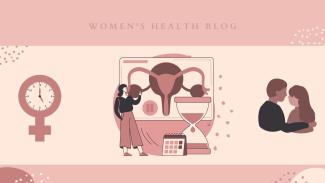Author: Bhairavi Warke, PhD Student, Simon Fraser University Editors: Negin Nia and Arrthy Thayaparan (Blog Coordinators)
Published: April 8th, 2022
What is lived experience of Menopause?
Menopause is when one has gone an entire year without a menstrual period. The average age for menopause is 51 years. It is preceded by Perimenopause, when women start noticing physical and psychological changes, and followed by post-menopause. This transition can be challenging for many due to symptoms like hot flashes, night sweats, mood swings, etc. Not only does it affect women’s physical and psychological well-being, but it may significantly affect their personal and social lives. For example, menopause symptoms can cause limitations in family life, relationships, professional activities, and more. Additionally, every woman’s experience can greatly vary in terms of the severity and duration of symptoms. For some, the symptoms of menopause can last over a decade and thus, significantly lower their Quality of Life (QoL).
The World Health Organization (WHO) defines Quality of Life as, “an individual's perception of their position in life in the context of the culture and value systems in which they live, and in relation to their goals, expectations, standards and concerns. QoL is a multi-dimensional concept affected in a complex way by the person's physical health, psychological state, level of independence, social relationships, personal beliefs and their relationship to their environment.”
Although it is a natural phase of life, most women struggle to find relevant information that may help them navigate the menopause journey. Women often feel a sense of isolation or lack of support in social settings. Now-a-days, women exchange information in smaller close-knit groups or over online menopause forums to seek help and support beyond their doctors. Despite the sheer number of people who experience menopause, it still seems to bear stigma and is not yet a commonplace topic in public discourses. Menopause is seen as a personal and private health condition than a regular aspect of life and women are expected to “just figure it out” themselves as they go through it. In addition, post-menopausal women are more vulnerable to heart disease, osteoporosis, and breast, ovarian, or uterine cancers. Thus, understanding the impact of the menopause transition on women’s day-to-day lives, i.e. the lived experience, is crucial to address some of the challenges they face.
Why is it important?
We know that menopause is influenced by more than the physiological changes associated with it. The socio-cultural understandings of menopause have a significant impact on women’s experience of it. However, we know little about how this affects women’s ability to adapt to the new phase of life. Menopause and aging women’s needs are often ignored or rarely discussed in mainstream healthcare product and service innovations. This makes it a hidden reality that not only impacts women’s preparedness for this journey, but it also influences how they can participate and contribute to society. Moreover, the socio-economic burdens and costs of healthcare for women in menopause can be very high. Studies have shown that education, appropriate guidance and effective management can have real benefits in improving women’s QoL as they go through this transition.
Opportunities in Personal Technology
Personalised self-care technologies are becoming more and more ubiquitous. For example, we are surrounded by a large number of fitness trackers and health apps. These technologies focus on tracking personal data like weight, energy levels, physical activities, time usage, sleep and learning strategies, and are intended for self-improvement and behaviour change. Despite their growing success, the existing landscape of interactive self-tracking tools for menopause care is sparse, often limited to period tracking, coaching and information sharing applications. There are a lack of meaningful interventions that could help women through their menopause journey, beyond just tracking symptoms, and seamlessly integrate it within their lifestyles to improve their quality of life.
Where can we start?
To design better self-care tools that are useful for women experiencing menopause, we need to: a) talk to experts in women’s health, and b) understand the lived experience of menopause from women themselves.
In the initial stage of this research, we, the researchers at the Pain Studies Lab in SFU, are planning to conduct a participatory workshop to explore the lived experiences of menopause from experts in women’s health and from women who are experiencing perimenopause, menopause or post-menopause. The workshop will be conducted online via video conferencing (like Zoom) and participants will discuss how the different stages of menopause affect the day-to-day realities of someone’s life. The workshop will conclude with a short brainstorming activity to explore ideas of what may help women during this transition and benefit their long-term quality of life.
How can we get in contact with you?
If you are an academic researcher or professional expert working in fields related to women’s health or menopause care, WE NEED YOUR HELP!
Please contact me at bwarke@sfu.ca if you would like to participate in this 2.5-hr online workshop. Participants will be compensated with $20 for their time and contribution.
(Note: We refer to all individuals experiencing symptoms of menopause as ‘women’ in this article. However, we acknowledge all individuals who may or may not identify as ‘women,’ but experience menopause or like symptoms, as a part of this research.)
